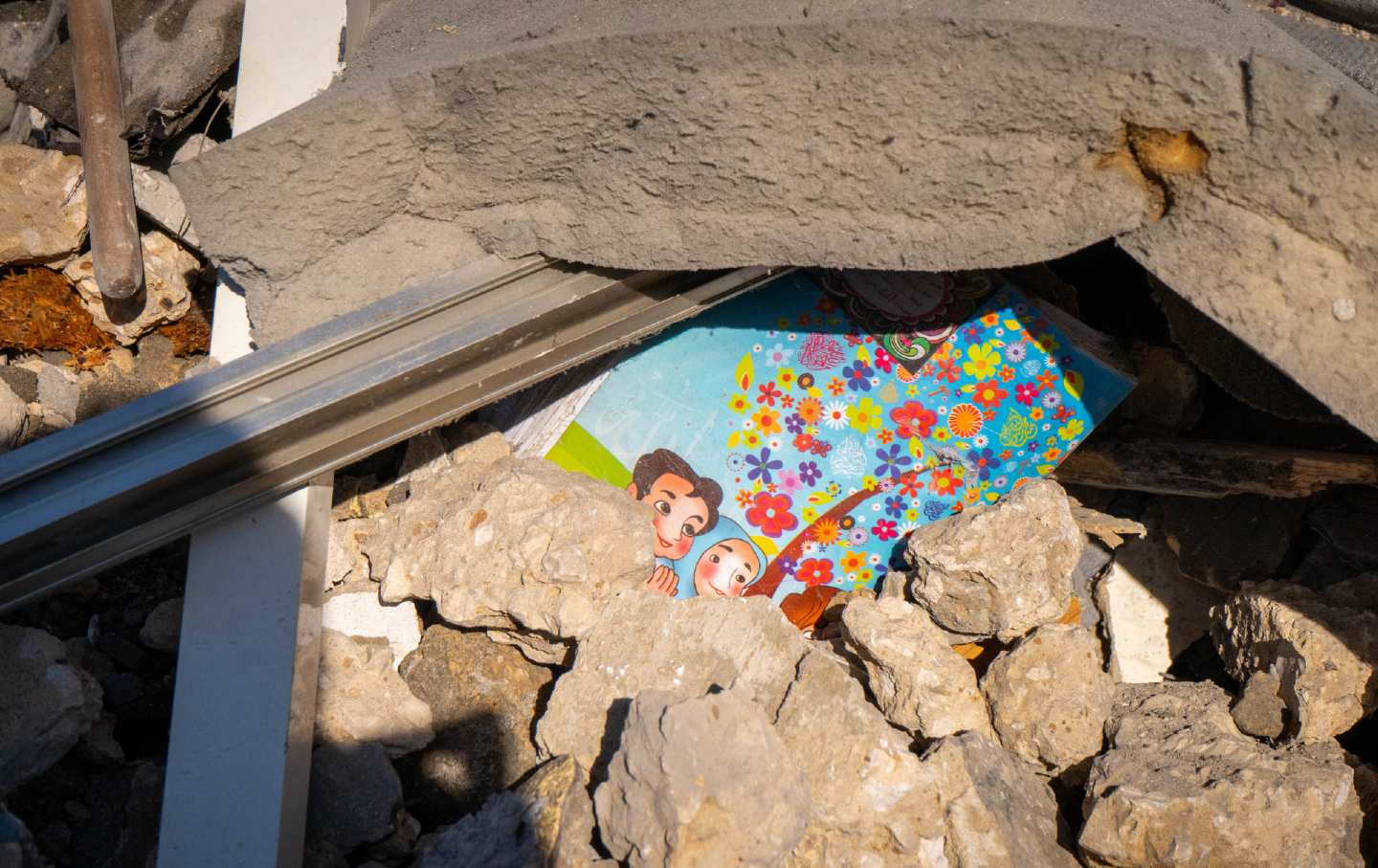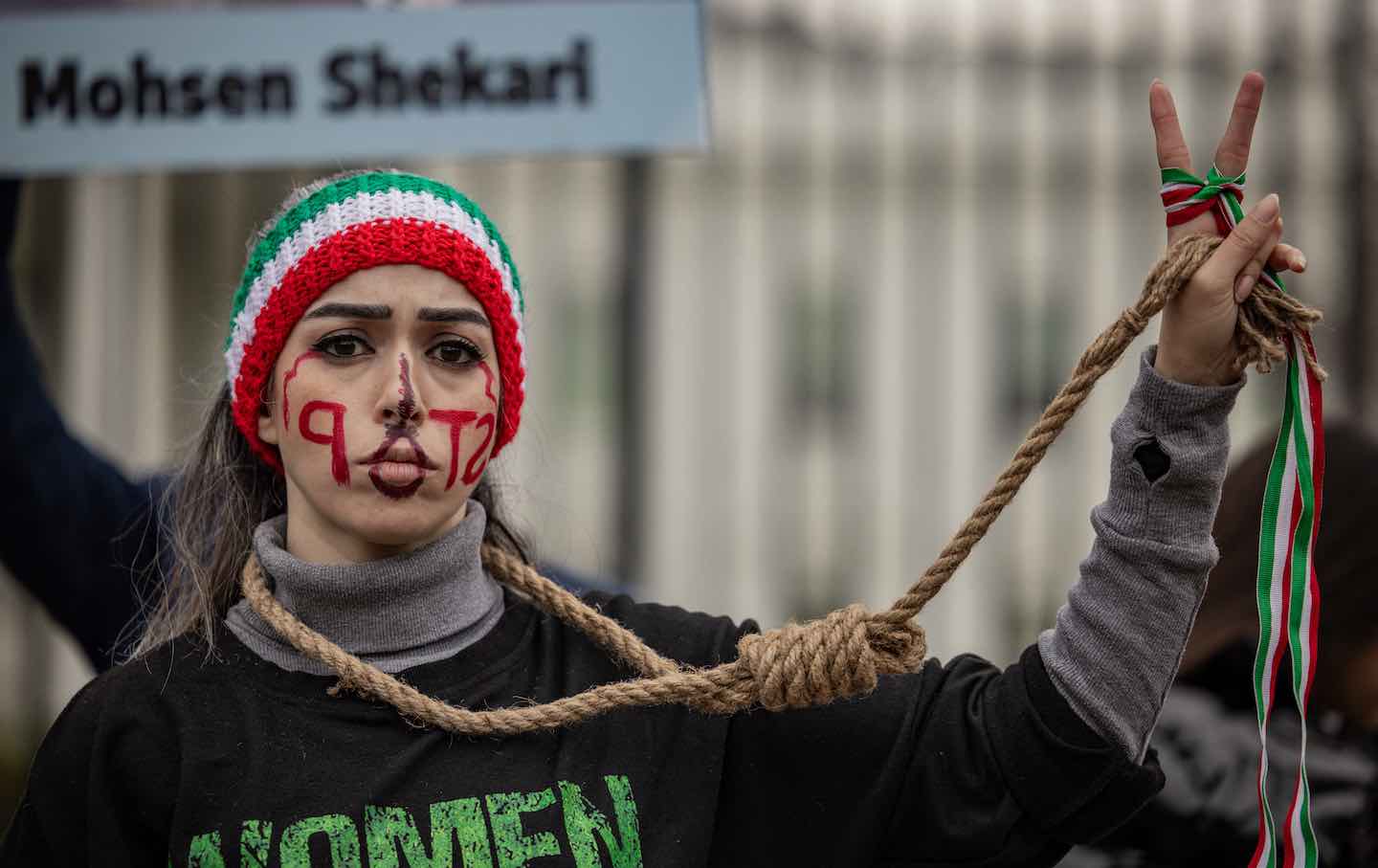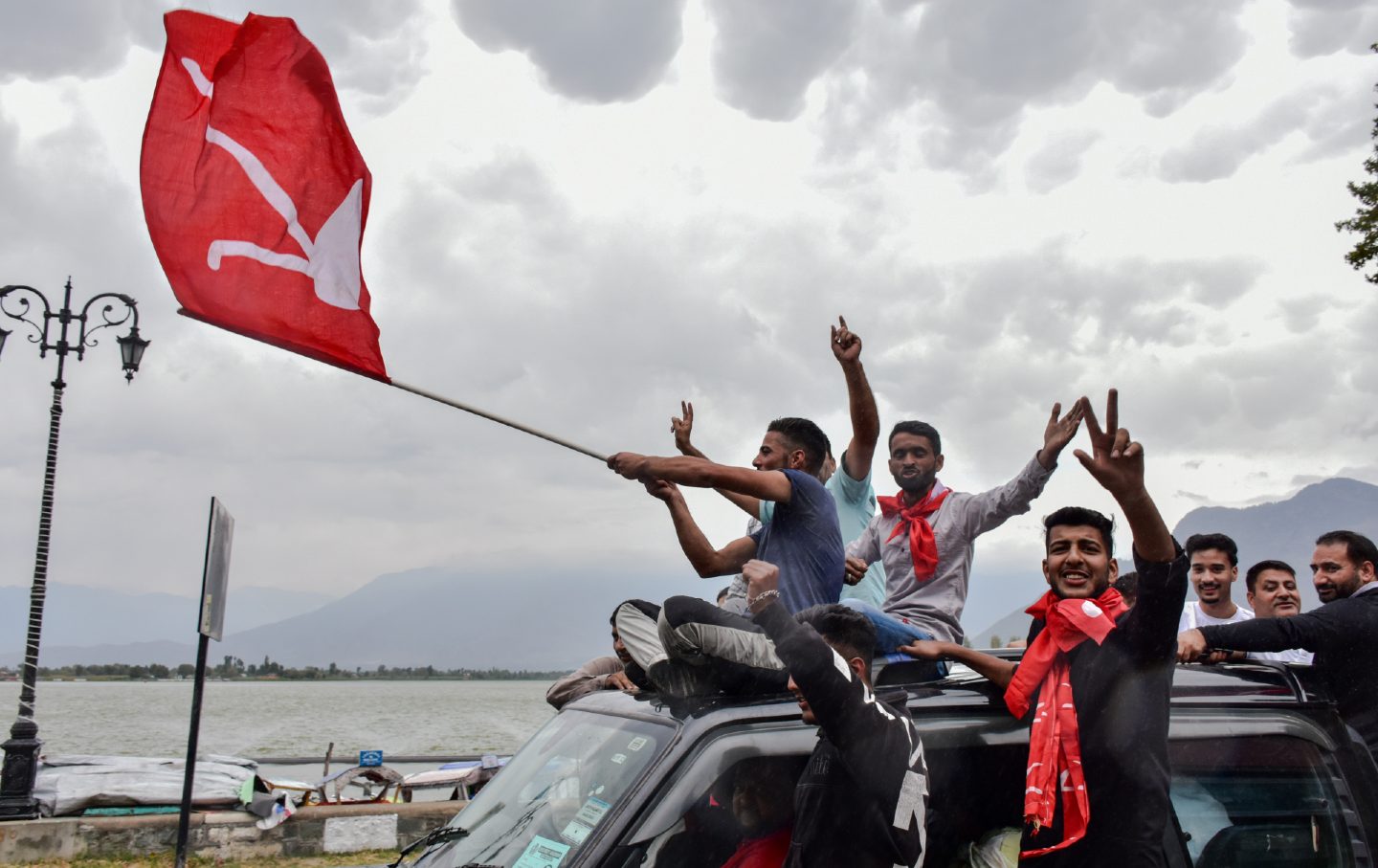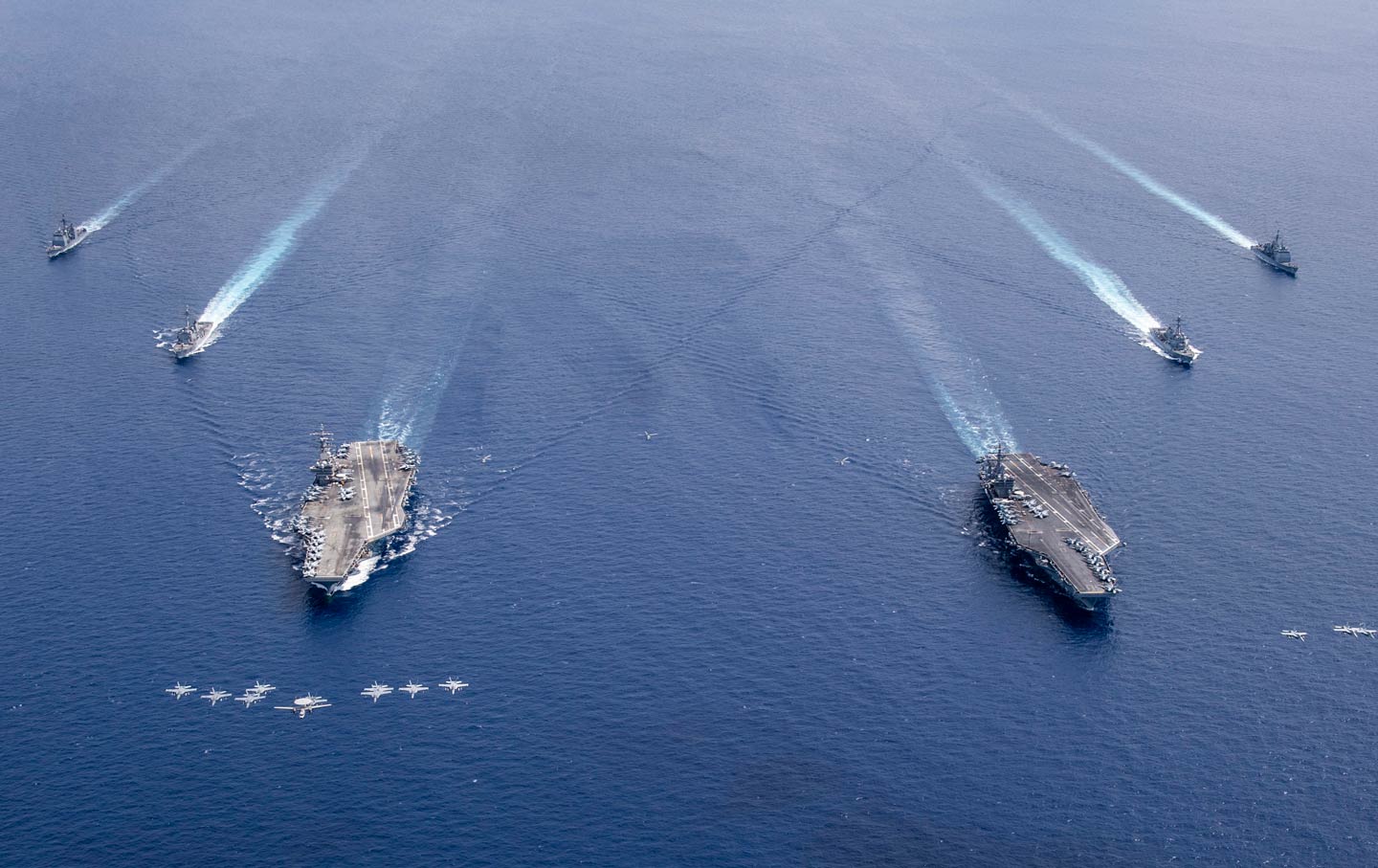Arab Citizens Are Livid Over Gaza. The US Ignores Them at Its Peril.
Ordinary people across the Middle East are being crystal clear about the depth of their opposition to the White House’s Israel policy—and that of their own governments.

Pro-Palestinian demonstrators in Cairo on October 20, 2023.
(Mohamed Hossam / Getty Images)Nearly four months have passed since Hamas attacked Israel and Israel launched its bombardment of the Gaza Strip. The scale of the tragedy in Gaza is impossible to comprehend: over 26,000 killed, 70 percent of homes destroyed, 90 percent of the people of Gaza displaced. Famine in Gaza has begun, with a projected half a million people facing “catastrophic” conditions. Despite images of tortured Palestinians, the demolition of universities, and American citizens shot down in the occupied territories, the Biden administration continues to merely express “concern” while maintaining its material support of the current status quo.
On top of that, discussions about the “day after” the war continue unabated, seeming increasingly disconnected from reality. While the Israeli government insists that it will not allow any other military to operate in the Gaza Strip and that no Palestinian state will ever come to fruition, Biden administration officials continue to talk about a two-state solution and a possibly “revamped” Palestinian Authority overseeing Gaza. Alarmingly, and despite the events of the past few months, the Biden administration is also still pursuing of a Saudi-Israeli normalization deal, promising that Palestinians would get “a practical pathway” to a state with such an arrangement.
As I have written previously, Arab-Israeli normalization has little to do with the resolution of the Israeli-Palestinian conflict. In fact, evidence suggests such normalization worsens conditions for Palestinians in the occupied territories and Arab citizens in normalizing countries alike.
The notion that Arab-Israeli normalization facilitates Israeli-Palestinian peace seems instead a fig leaf, covering up the fact that successive Israeli governments—especially under Prime Minister Netanyahu—have never considered the possibility of a Palestinian state to begin with. Such deals are nothing more than an illiberal peace, designed to perpetuate a violent status quo.
The fact that the Biden team continues to throw its weight behind Arab-Israeli normalization nevertheless indicates that this administration has not absorbed any lessons from the past decade of US foreign policy, or the past 100 days of war. It also shows that they continue to presume that such a decisive policy can be imposed on the Arab world.
This is a dangerous assumption to make, and it has played very poorly with Arab citizens across the Middle East. Recent polling from the Arab Opinion Index—which included 8,000 respondents from 16 countries throughout the region—shows that anger over Israel’s war on Gaza, and the American response, is at an all-time high.
When respondents were asked why Israel continues its war on Gaza, the top reason given was continued US military support. Ninety-four percent of respondents evaluated the US response to Israel’s war as bad or very bad, and 81 percent said Washington is not serious about establishing a Palestinian state. In comparison, 37 percent and 42 percent of respondents evaluated the Iranian and Russian responses negatively, respectively.
Importantly, the second top reason given by respondents for why the war continues unabated is the inaction of Arab governments. When asked what measures Arab governments should take to stop the war, suspending relations or attempts at normalization with Israel was the most prevalent answer.
This is not surprising to anyone who follows the politics of the Arab world. The Palestinian cause has long been a source of mobilization and a gateway to dissent across the region. Historically, images from Palestine have facilitated political engagement and cycles of protest. Indeed, for many activists, the fact that their governments pursue normalization despite Palestinian suffering is connected to the way those same governments suppress citizens at home. Activists consider both foreign and domestic policy as manifestations of undemocratic, repressive rule. This connection is further strengthened when Arab governments utilize their ties with Israel to expand their states’ ability to oppress their citizens. Thus, the extreme levels of disapproval that these polls reveal are, to any honest observer, predictable.
Furthermore, rage at the ongoing war, Arab governments, and American involvement has manifested in protests across the region. Demonstrations have occurred in countries that have recently signed normalization deals with Israel, such as Bahrain, as well as countries with highly repressive leaders such as Egypt. Despite heavy government suppression, Egyptian protesters broke through police barricades and entered Tahrir Square—the site of the January 25 revolution that ousted former President Hosni Mubarak—for the first time since the coup that brought the current regime to power, over 10 years ago. Palestine is once again facilitating the political engagement of a new generation, and activists are decisively breaking the fear barrier. Protesters in Cairo recently went so far as to chant: “As long as Arab blood is cheap, down with any president!”
While it is true that protests over the war have not led to large changes in policy, and they are certainly far from the scope of the protests seen during the Arab Spring uprisings, what this polling reflects is the very real possibility of mass upheaval. This latest polling shows not only high levels of disapproval for both American and Arab policy but also a high level of reported personal and psychological stress as a result of the war. Alongside growing domestic grievances over economic stagnation, corruption, and repression, this becomes fertile ground for even more mass unrest.
Research has shown that anger is an emboldening emotion, helping to overcome fear. All it takes to activate these emotions and turn them into mass mobilization is a moral shock—“a visceral reaction against a reprehensible reality”—alongside the idea that protests might be meaningful.
The American government has paid scant attention to the anger of ordinary Arab citizens since October 7. Instead, it has largely focused on the role and impact of militia groups such as Hezbollah and the Houthis, and their Iranian backers. Undoubtedly, those actors have already significantly disrupted American interests and will continue to pose a threat as they win the narrative war in the region.
But the White House has failed to recognize that unrest could easily stem from the grassroots as well. The United States is already deeply implicated in what has transpired in Gaza. If the only path forward, from the American perspective, involves pushing a deeply unpopular policy of normalization on the Arab people, more rage and unrest is practically guaranteed. It goes without saying that this would not be helpful for long-term American interests, as the events of the last 100 days should have made clear. But, even more worryingly, such a course of action will mean dimming the possibility of sustainable peace in the region for many years to come.
Can we count on you?
In the coming election, the fate of our democracy and fundamental civil rights are on the ballot. The conservative architects of Project 2025 are scheming to institutionalize Donald Trump’s authoritarian vision across all levels of government if he should win.
We’ve already seen events that fill us with both dread and cautious optimism—throughout it all, The Nation has been a bulwark against misinformation and an advocate for bold, principled perspectives. Our dedicated writers have sat down with Kamala Harris and Bernie Sanders for interviews, unpacked the shallow right-wing populist appeals of J.D. Vance, and debated the pathway for a Democratic victory in November.
Stories like these and the one you just read are vital at this critical juncture in our country’s history. Now more than ever, we need clear-eyed and deeply reported independent journalism to make sense of the headlines and sort fact from fiction. Donate today and join our 160-year legacy of speaking truth to power and uplifting the voices of grassroots advocates.
Throughout 2024 and what is likely the defining election of our lifetimes, we need your support to continue publishing the insightful journalism you rely on.
Thank you,
The Editors of The Nation
More from The Nation

Stop Sending American Bombs to Israel Stop Sending American Bombs to Israel
Halting offensive arms transfers now would put the administration on a new path—and align Harris with the majority of Democrats who support conditions on weapons aid to Israel.

Women Are Leading the Resistance Against Executions in Iran Women Are Leading the Resistance Against Executions in Iran
Their prominence in the ongoing struggle for human rights has been met with fierce crackdowns by the state.

The Party Promising Kashmiri Statehood Wins an Election The Party Promising Kashmiri Statehood Wins an Election
In the first vote since India revoked the statehood status of Jammu and Kashmir, the National Conference party emerged with the most seats in the Legislative Assembly.

“The Israeli Army Martyred My Father”: What Gaza's Journalists Have Endured “The Israeli Army Martyred My Father”: What Gaza's Journalists Have Endured
Three Palestinian journalists describe what it is like to report from the middle of a genocide.

Israel Is Killing Whole Families in Gaza—With Weapons Made in America Israel Is Killing Whole Families in Gaza—With Weapons Made in America
Five-year old Hind Rajab was the victim of a bomb manufactured in Iowa. Months later, the Biden administration is still sending weapons.

The New Cold War in the Pacific Is Dangerously Close to Heating Up The New Cold War in the Pacific Is Dangerously Close to Heating Up
Bristling with armaments and seemingly strong, the current ad hoc Western coalition may yet prove, like NATO, vulnerable to sudden setbacks from rising partisan pressure...


